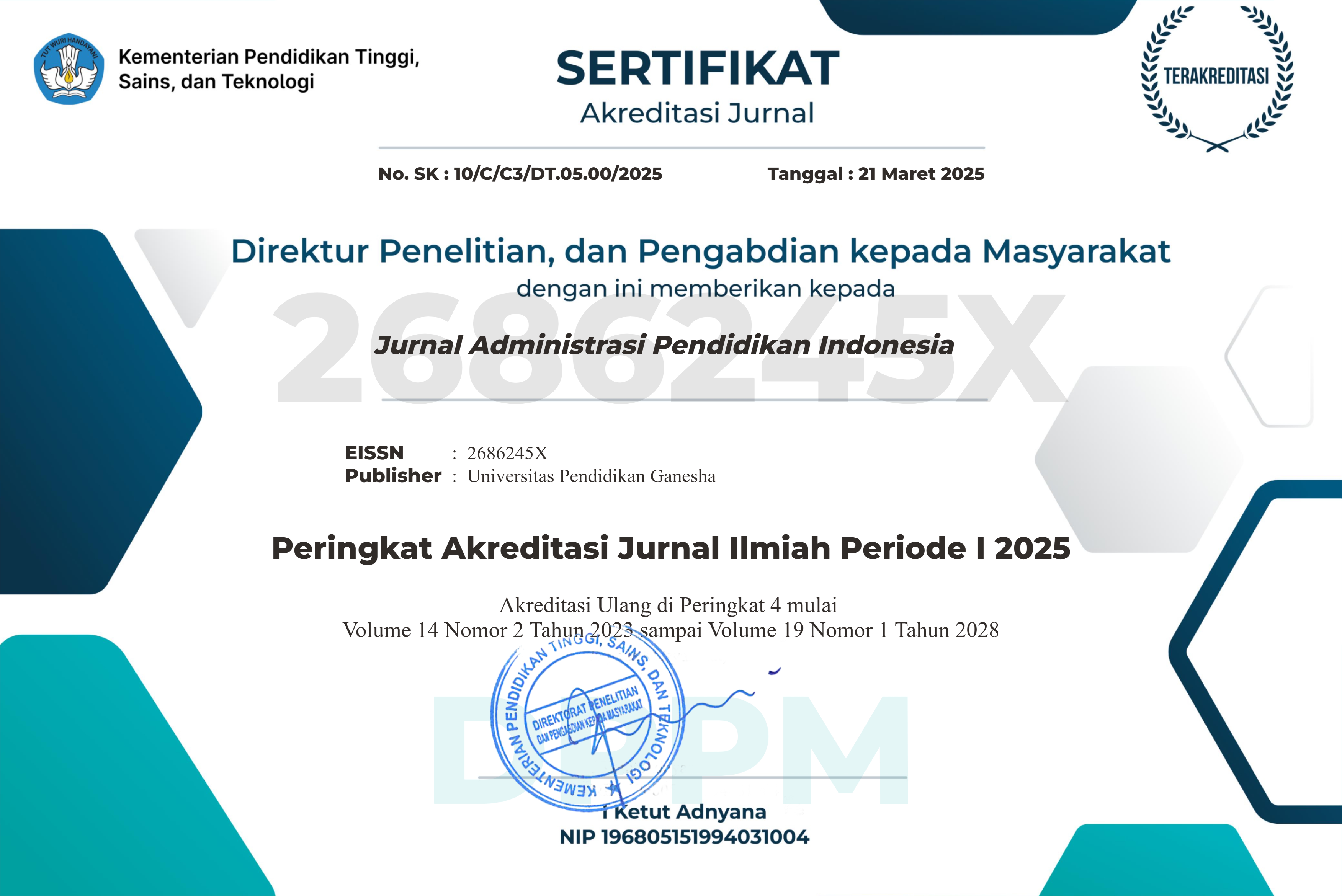Evaluation of Implementation of An Industry-Certified Productive Teacher Apprenticeship Program at The Center for Excellence Vocational School in Denpasar City
DOI:
https://doi.org/10.23887/jurnal_ap.v14i1.1831Keywords:
evaluation, productive teacher apprenticeship, CIPPAbstract
This study aims to describe the effectiveness of the implementation of an industry-certified productive teacher apprenticeship program at the Center for Excellence Vocational School in Denpasar City in terms of variables: context, input, process, and product. Then evaluate jointly in terms of context, input, process, and product, as well as the constraints encountered and the solutions to the implementation of an industry-certified productive teacher apprenticeship program at the Center for Excellence Vocational School in Denpasar City. The subjects in this study were 56 productive teachers who had implemented an industry-certified teacher apprenticeship program and were selected based on a purposive sampling technique. This research is evaluation research with a quantitative approach using the CIPP model (context, input, process, and product). Data were collected using questionnaires, documentation, and interviews and were analyzed descriptively and quantitatively. Data analysis was performed by converting the raw score into a Z score (z-score) followed by a T score and then converted into the Glickman quadrant. The results of the study show the effectiveness of the implementation of the industrial-certified productive teacher apprenticeship program from the context of obtaining effective results (+), the effectiveness of the implementation of the industrial-certified productive teacher apprenticeship program in terms of the input obtained effective results (+), the effectiveness of the implementation of the industrial-certified productive teacher apprenticeship program in terms of process obtained less effective results (-), the effectiveness of the implementation of the industrial-certified productive teacher apprenticeship program in terms of the product obtained effective results (+). Overall, the evaluation of the context, input, process, and product variables in the implementation of the industrial-certified productive teacher apprenticeship program at a vocational center of excellence in Denpasar city is classified as effective (+ + - +).
References
Agung, A. A. G., & Koyan, I. W. (2020). Evaluasi Program Pendidikan. Prodi Teknologi Pendidikan Fakultas Ilmu Pendidikan Undiksha.
Darmana. (2020). Evaluasi Penerapan Sistem Layon Sari (Layanan Online Satu Jari) Di Fakultas Bahasa Dan Seni Universitas Pendidikan Ganesha. Jurnal Adiministrasi Pendidikan Pascasarjana Universitas Pendidikan Ganesha, 2(1), 20–31. https://repo.undiksha.ac.id/4499/
Kemdikbud. (2020). Instruksi Presiden Nomor 9 Tahun 2016 Dan Peraturan Presiden Nomor 18 Tahun 2020 Tentang Rencana Pembangunan Jangka Menengah Nasional Tahun 2020-2024.
Peraturan Menteri Ketenagakerjaan Nomor 36 Tahun 2016 Tentang Penyelenggaraan Pemagangan Di Dalam Negeri Pasal 5: Penyelenggara Pemagangan Harus Memiliki: Antara Lain Tenaga Pelatihan Dan Pembimbing Pemagangan, (2016).
Nanda, G., & Ningrum, T. A. (2019). Pengelolaan Magang Guru SMK Paket Keahlian Teknik Sepeda Motor Berbasis Kemitraan. INA-Rxiv, 2(1), 1–11. https://www.researchgate.net/publication/337809049_Pengelolaan_Magang_Guru_SMK_Paket_Keahlian_Teknik_Sepeda_Motor_Berbasis_Kemitraan
Nur Kholifatur, R. (2021). Evaluation of the Use of Public High School Digital Libraries in Buleleng Regency. Jurnal Administrasi Pendidikan Pascasarjana Undiksha, 13(1), 83–93. https://ejournal2.undiksha.ac.id/index.php/jurnal_ap/article/view/961
Sabon, Sili, S., Listiawati, N., & Relisa. (2020). Model Magang Guru Untuk Meningkatkan Mutu Pembelajaran Di Smk. Jakarta: puslitjakdikbudkemdikbud.
Stufflebeam, D. L., & Zhang, G. (2017). The CIPP Evaluation Model How to Evaluate for Improvement and Accountability. The Guilford Press.
Sunardi, & Sudjimat, D. A. (2016). Magang Guru Untuk Meningkatkan Relevansi Kompetensi Profesional Guru Produktif SMK. Teknologi Dan Kejuruan, 39(2), 171–182. http://journal.um.ac.id/index.php/teknologi-kejuruan/article/view/7791
Sunu, I. G. K. A. (2015). Manajemen Kelas. Singaraja: Media Akademi.
Usep. (2017). Pengelolaan Magang Guru Produktif SMK Paket Keahlian Teknik Sepeda Motor Berbasis Kemitraan. Jurnal Administrasi Pendidikan STAIPI Garut, 21(1), 81–92. https://ejournal.upi.edu/index.php/JAPSPs/article/view/6527
Yunizar, A. (2021). Pelaksanaan Program Guru Magang Kerja Sama Sekolah Menengah Kejuruan Negeri 4 Palembang Dengan Pt.Semen Baturaja (Persero) Tbk. Angkatan I Tahun 2021. Jolma, Jurnal Online Laporan Magang, 1(1), 1–4. https://www.researchgate.net/publication/357418927_Pelaksanaan_Program_Guru_Magang_Kerja_Sama_Sekolah_Menengah_Kejuruan_Negeri_4_Palembang_Di_PTSemen_Baturaja_PerseroTbk_Angkatan_I_Tahun_2021
Yustiana, M. (2020). Pembinaan Untuk Mengoptimalkan Hasil Kegiatan Magang Guru Produktif SMK Negeri 3 Magelang Melalui Learning Community. Syntax Idea V, 2(1), 59–66. https://jurnal.syntax-idea.co.id/index.php/syntax-idea/article/view/127











